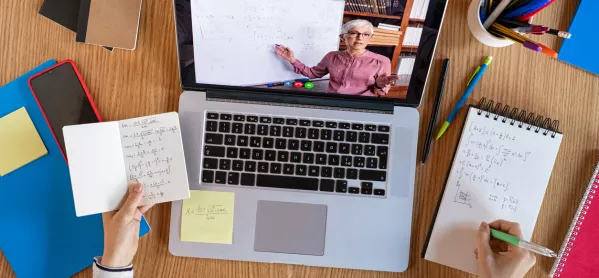- Home
- Coronavirus: Free laptops for disadvantaged pupils
Coronavirus: Free laptops for disadvantaged pupils

Disadvantaged children “in the most vital stages of their education” will be given free laptops and tablets in a bid to make remote learning easier during the coronavirus lockdown, the government has announced.
Devices will be ordered for disadvantaged children in Year 10; those who receive support from a social worker; and care leavers.
The Department for Education was unable to reveal last night how much it intends to invest in the scheme, but said it would be in the millions.
Coronavirus: Williamson backs national online academy
Exclusive: National edtech hub needed to close gap
Advice: Taking small steps into online learning
It was also unable to confirm how many children it hopes to support, or how it is defining “disadvantaged” pupils, but said further details would be released in the coming days.
Tes understands that the scheme will target children on free school meals, but there will be a degree of flexibility in who is eligible.
Coronavirus: Free laptops to help with remote learning
The devices will not be available to pupils who already have access to one.
The government will also provide 4G routers to vulnerable pupils who do not have access to the internet.
Meanwhile, the country’s major telecommunications providers will make it easier for families to access selected educational resources by temporarily exempting these sites from data charges.
The DfE added that schools will be able to keep the laptops and tablets once they have reopened.
School leaders have welcomed the support for disadvantaged pupils sitting their GCSEs next year, but called on the government to “widen” the scheme to include other children who are likely to suffer the “greatest detrimental impact to their education” while schools are closed.
Geoff Barton, general secretary of the Association of School and College Leaders, said: “We note that the planned roll-out for disadvantaged pupils applies only to those in Year 10. The government is right to identify this as a key group because they are in the midst of studying for GCSEs.
“However, we hope that it will prove possible to widen this scheme to other disadvantaged youngsters who do not have these devices.
“It is absolutely vital that we do everything possible to support these young people because they are likely to suffer the greatest detrimental impact to their education during the school shutdown.”
Paul Whiteman, general secretary of school leaders’ union the NAHT, added: “Today’s announcement is a welcome step in the right direction towards making sure that all children, irrespective of circumstance, can access online learning resources now and in the longer term.
“Every phase of education is important, and we hope to see this scheme expanded so that the least advantaged children across all ages and stages have the technology they need to help them succeed.
“Of course, a project of this scale will require careful planning and there are significant logistical challenges to be overcome, not least the speed at which these devices can be sourced and delivered.
“If successful, the scheme could make a real difference to many disadvantaged young people in the coming months.”
The education secretary has also thrown his weight behind a national online academy providing a “comprehensive” virtual curriculum for schools to use during the crisis.
Oak National Academy, which has the backing of nine multi-academy trusts, will provide a “sequenced” plan of hour-long lessons and curricular resources, including videos, worksheets and quizzes, compiled by 40 teachers from some of the country’s “top-performing” schools.
Mr Williamson said: “I want to thank all the teachers and staff who are working so hard to ensure vulnerable children and those of critical workers are supported at this time.
“Schools will remain closed until the scientific advice changes, which is why we need to support the incredible work teachers are already doing to ensure children continue to receive the education they deserve and need.
“By providing young people with these laptops and tablets and enabling schools to access high-quality support, we will enable all children to continue learning now and in the years to come.
“We hope this support will take some of the pressure off both parents and schools by providing more materials for them to use.”
Keep reading for just £1 per month
You've reached your limit of free articles this month. Subscribe for £1 per month for three months and get:
- Unlimited access to all Tes magazine content
- Exclusive subscriber-only stories
- Award-winning email newsletters



